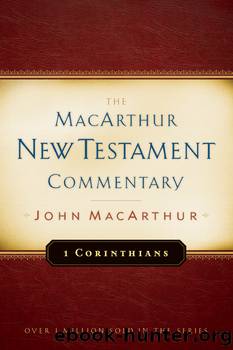1 Corinthians MacArthur New Testament Commentary by John MacArthur

Author:John MacArthur [MacArthur, John]
Language: eng
Format: epub
ISBN: 978-1-57567-943-3
Publisher: Moody Publishers
Published: 1984-03-14T16:00:00+00:00
THE PRINCIPLES FOR USING CHRISTIAN FREEDOM
In verses 23-30 four basic principles are given to guide us in using our Christian liberty for Godâs glory.
EDIFICATION OVER GRATIFICATION
All things are lawful, but not all things are profitable. All things are lawful, but not all things edify. (10:23)
Here Paul summarizes what he has been saying about Christian freedom. Because the apostle refers to it several times, he had probably used the phrase all things are lawful when he preached in Corinth, and some of the believers there apparently had taken it as a slogan to justify anything they wanted to do. The apostle explains earlier in this letter, however, that his use of that phrase in relation to Christian liberty means all things not specifically identified in Scripture as sinful. Before he first mentions that âall things are lawfulâ (6:12), he specifically says that âthe unrighteous shall not inherit the kingdom of God,â and proceeds to give an extensive list of sins that characterize the unrighteous (6:9-10). His use of all things are lawful always refers to questionable practices, the gray areas of Christian living that are not specifically forbidden in the Bible.
The basic meaning of edify (oikodomeÅ) is âto build a house,â and, by extension, the term refers to the literal or figurative building of anything. It is often used in the New Testament to describe the spiritual growth, or upbuilding, of believers. Whatever contributes to spiritual growth constitutes what is profitable, or beneficial, helpful, advantageous, or useful. Only things that are profitable are able to edify. Those two present active indicative verbs basically convey the same truth.
There are many ways in which we are built up, in which we âgrow in the grace and knowledge of our Lord and Savior Jesus Christâ (2 Pet. 3:18), but there are four basic tools to help us grow in Him. First is His Word. In his counsel to the Ephesian elders who had come to Miletus to see him for the last time, Paul said, âAnd now I commend you to God and to the word of His grace, which is able to build you up and to give you the inheritance among all those who are sanctifiedâ (Acts 20:32). Godâs Word is His supreme means of building us up (cf. 2 Tim. 3:16-17). Second is preaching and teaching. Later in this letter to the Corinthians Paul tells them that, rather than being so concerned about speaking in tongues, they should focus on prophesying, or preaching, which âspeaks to men for edification and exhortation and consolation.â The âone who prophesies edifies the churchâ (1 Cor. 14:3-4). Third is love. Knowledge tends to make us proud and arrogant, whereas âlove edifiesâ (1 Cor. 8:1). Fourth is obedient service. The purpose of the Christian ministry is to equip âthe saints for the work of service, to the building up of the body of Christâ (Eph. 4:12).
Desiring the spiritual benefit and edification of ourselves and of others is a hallmark of Christian maturity. Paul told the Ephesian elders that he had not withheld from them âanything that was profitableâ (Acts 20:20).
Download
This site does not store any files on its server. We only index and link to content provided by other sites. Please contact the content providers to delete copyright contents if any and email us, we'll remove relevant links or contents immediately.
| New Testament | Old Testament |
The Five People You Meet in Heaven by Mitch Albom(3549)
The Secret Power of Speaking God's Word by Joyce Meyer(3159)
Real Sex by Lauren F. Winner(3005)
Name Book, The: Over 10,000 Names--Their Meanings, Origins, and Spiritual Significance by Astoria Dorothy(2969)
The Holy Spirit by Billy Graham(2938)
0041152001443424520 .pdf by Unknown(2842)
How The Mind Works by Steven Pinker(2811)
ESV Study Bible by Crossway(2772)
Ancient Worlds by Michael Scott(2677)
Churchill by Paul Johnson(2576)
The Meaning of the Library by unknow(2563)
The ESV Study Bible by Crossway Bibles(2546)
The Gnostic Gospels by Pagels Elaine(2517)
MOSES THE EGYPTIAN by Jan Assmann(2411)
Jesus by Paul Johnson(2349)
City of Stairs by Robert Jackson Bennett(2337)
The Complete Dead Sea Scrolls in English (7th Edition) (Penguin Classics) by Geza Vermes(2269)
The Nativity by Geza Vermes(2224)
Ancient Near Eastern Thought and the Old Testament by John H. Walton(2219)
